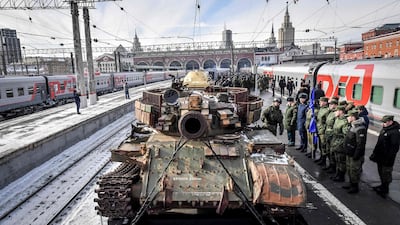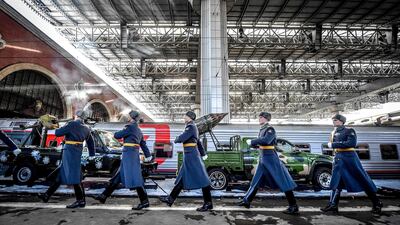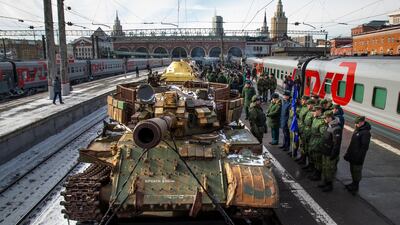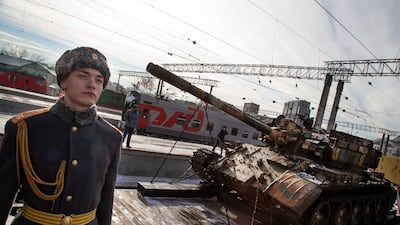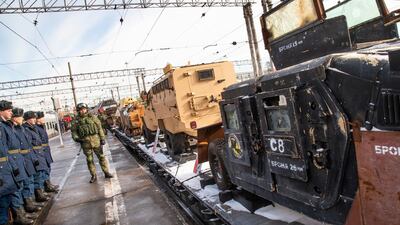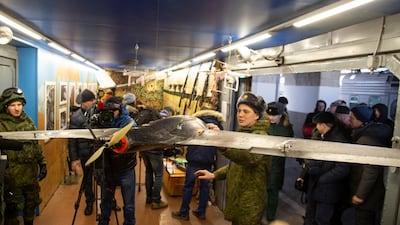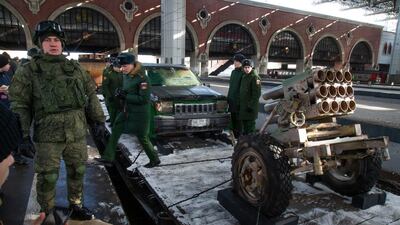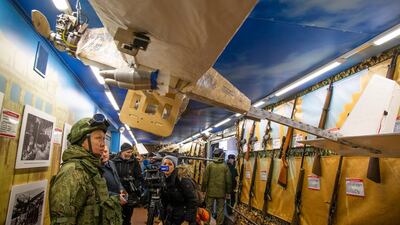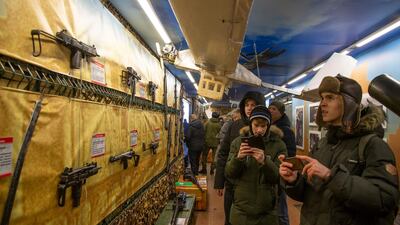Russia is flaunting the trophies of its war in Syria with a nationwide exhibition of armoured vehicles, drones and weapons its army says it captured from militant groups in the country.
A rail car carrying the war spoils will travel across Russia’s 11 time zones over several months. The display, consisting of about 500 pieces of military equipment that includes tanks, assault rifles a wide array of drones and armoured vehicles repurposed by ISIS for use in kamikaze attacks.
The exhibition, dubbed “Syrian Breakthrough”, is being organised by the Defence Ministry and is said to have received the approval of President Vladimir Putin.
The dates that the exhibition will traverse the country are symbolic. The rail-car museum opened in Moscow on Saturday, a national holiday in Russia called “Defender of the Fatherland Day”, when Russians celebrate the country’s armed forces. It has been timed to end ahead of May 9, when Russia celebrates its victory over Nazi Germany in 1944 with a large military parade through Red Square.
The tour is scheduled to make 61 stops across Russia, from Vladivostok near the border with China down to Crimea, annexed by Russia from Ukraine in 2014.
Some of the armoured vehicles being paraded through Russia, which include a T-55 tank, bear the markings of the Free Syrian Army and the United Nations. Russian Deputy Defence Minister Andrei Kartapolov said in Moscow on Saturday that the hardware originated in countries including Georgia and China.
"Everything here is real,” said Major General Alexander Yaroshevich at the opening of the exhibition in Moscow. “Displaying these items produced in European countries and America shows visitors everything that we deal with in Syria."
Russia’s intervention in the Syrian war in late 2015 on the side of embattled president Bashar Al Assad, is widely credited with having turned the tide of the war in favour of the Syrian regime.
The Kremlin said its air campaign was launched to rout terrorists, including ISIS, but war observers say Russian air strikes have been responsible for the deaths almost 20,000 civilians.
The tour is an extension of how the Kremlin has sold its military role in Syria as a revival of the army and of Russia's greatness, says Andrei Kolesnikov, Senior Fellow and Chair of Russian Domestic Politics Programme at Carnegie Moscow Centre. "This campaign had an effect – in the eyes of Russians it is one of the rare examples of victory," Mr Kolesnikov told The National.
But its impact is limited, he warned, saying that the exhibition may not boost Mr Putin’s overall trust ratings, which have plummeted to historic lows in recent months over Russia’s economic performance.
“Russia’s role in Syria doesn't mobilise people or help boost the president’s ratings,” he said. “This event is simply one more attempt to revitalise militarisation of the mass consciousness.”
The exhibition comes as Mr Putin and his counterparts from Iran and Turkey are working to find a political solution to the nearly eight-year conflict. Earlier this month, Mr Putin met Turkish President Tayyip Erdogan and Iran's Hassan Rouhani in the Black Sea town of Sochi to agree on how to wrest control of the last pockets of opposition for Mr Al Assad.
Mr Putin has sought to minimise Russia’s footprint on the ground in Syria by deploying a small contingent of military servicemen alongside fighters from private mercenary groups with links to the Kremlin.
However, the conflict has served as an important training ground for the Russian army. About 200 pieces of new military equipment were tested on the ground in Syria and according to a senior military officer, 60 per cent of the Russian military police have participated in special operations in Syria.
Some of those officers will accompany the “Syria Breakthrough” exhibition across Russia as guides.
“War experience in Syria has been invaluable to the officers,” Lieutenant General Vladimir Ivanovsky, the chief of Russia’s military police, told Russian media this week.
